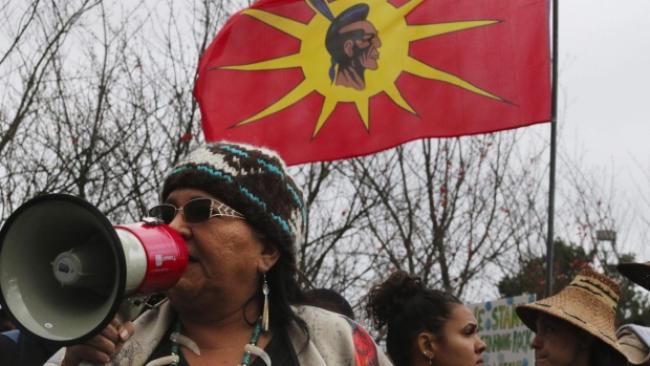Articles Menu

Prime Minister Justin Trudeau's decision to green-light Kinder Morgan's Trans Mountain pipeline has prompted First Nations youth to launch a "water protector fund" to raise money for cross-country protests to stop pipeline construction.
The Assembly of First Nations' Youth Council said Thursday the money will be used to help supply camps they expect to build along the pipeline's route, similar to what was organized in Standing Rock, North Dakota, where thousands of protesters and members of various Native American tribes assembled on the Sioux reservation near the construction site of the Dakota Access Pipeline. Their protest was successful: the U.S. government halted construction on Sunday.
"It's not a matter of whether Standing Rock will happen in Canada, it's a question of when," Will Landon, the co-chair of the youth council, said in an interview with CBC News. "We're trying to make sure we have pre-emptive measures in place to get resources for when those camps do occur," he said.
Landon said that the fund, which will be called Nibi-ogichidaakwe, Ojibwe for "water protector," would only provide money for peaceful protests, water walks and public information sessions.
"There are some people out there that feel so oppressed and hurt and the only way they can express themselves is by lashing out ... but we want to [stop construction] through peaceful prayer. [Violence] is not a big concern. We want to make sure that we're maintaining that peaceful message."
The Standing Rock situation turned violent when police blasted protesters with rubber bullets and water cannons.

Protesters demonstrate over the construction of the Dakota Access oil pipeline. (Matt Rourke/AP Photo)
Landon said the council, and many Indigenous youth, were deeply disappointed — but not surprised — by Trudeau's decision to allow the $6.8-billion Trans Mountain project to proceed.
The youth council will be joining forces with the Treaty Alliance Against Tar Sands Expansion, a group composed of 120 First Nations and tribes across North America who oppose oilsands expansion and pipeline construction.
The alliance added new signatures to its modern-day treaty Thursday, including the Algonquin Nation, on whose territory the AFN's gathering was held this week.
The treaty signatories forbid proposed oilsands pipelines and rail projects, and associated tanker traffic — that will feed the expansion of the Alberta oilsands — from passing through their lands.
"You're damn right we're going to block you, and we're going to make sure we limit that type of activity in our lands," Quebec Chief Serge Simon, who helped launch the Treaty Alliance, said.
They've set their sights on the Trans Mountain, Enbridge's Line 3, Keystone XL and Energy East pipelines in particular, because of their concerns about spills or leaks that could contaminate water supplies.

Chief Bob Chamberlin, vice-president of the Union of British Columbia Indian Chiefs, beats a drum and sings during a protest in Vancouver against Kinder Morgan's Trans Mountain pipeline expansion project. Chamberlin has signed on to the Treaty Alliance, a group of chiefs opposed to oilsands extraction. (Darryl Dyck/Canadian Press)
"We're driving right off a climate cliff, and instead of slamming on the brakes, all we see the governments doing is stepping on the gas with these pipeline approvals," Chief Bob Chamberlin, vice-president of the Union of B.C. Indian Chiefs, said Thursday.
Simon said the oil should absolutely be left in the ground, and he wants to move towards further innovation in the clean-energy sector.
Landon said chiefs who support the oilsands, like Jim Boucher, from the Fort McKay First Nation, are short-sighted for backing fossil fuel extraction. Boucher's community is debt-free and largely self-funding, with an unemployment rate of zero thanks to the businesses it has created to supply the oilpatch.
"To me, there's no difference between oil dependence and being dependent on the government," Landon said. "You're still relying on something that has potential to harm your people and your constituents."
Landon said the youth were inspired to launch the water protector fund after hearing the words of 12-year-old Autumn Peltier, from Wikwemikong First Nation on Manitoulin Island.
Peltier had hoped to deliver a message to Trudeau Tuesday, before he addressed the assembly, but the prime minister didn't have time in his schedule.
She returned to the assembly Wednesday, and sang a water song and delivered an impassioned plea to chiefs to band together to stop pipeline construction.
"I'm sad because our waters are sick, not just here in Canada but all over the world," she said. "I worry that we will be facing the same situation in our neighbour country, where pipelines have burst and contaminated the land and water.
"I'm not standing here for fun. I'm here to make a serious statement. I don't want to come back when I'm 70 and nothing has been done. This land is not for sale or profit. We need to come together for our water," she said to much applause from the chiefs.
[Top photo: A tribal leader, addressing a crowd, denounces the construction of the Dakota Access Pipeline. The Assembly of First Nations' Youth Council is raising money to fund protests across the country to oppose oil pipeline construction. (Alan Berner/The Seattle Times via AP)]